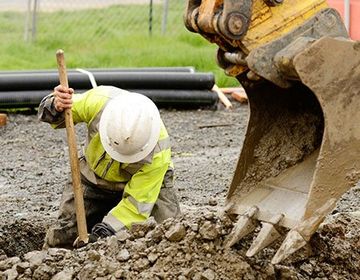Economical Lancaster Excavation - High Quality Excavation at Competitive Costs
Economical Lancaster Excavation - High Quality Excavation at Competitive Costs
Blog Article
Comprehensive Excavation Techniques: Understanding the Basics for Success
The mindful planning, accurate implementation, and precise interest to information called for in excavation projects demand a comprehensive strategy that includes different basic elements. The real proficiency exists not merely in comprehending these fundamentals yet in seamlessly incorporating them to browse the intricacies of excavation jobs with skill.
Recognizing Excavation Job Planning

Effective excavation jobs are improved the foundation of thorough and complete planning. The first stage of any excavation task is the drawing board, where essential choices are made that can substantially affect the end result of the task. Throughout this phase, it is necessary to collect all pertinent information concerning the website, including topographical studies, dirt structure, and any kind of prospective risks that might exist. Comprehending the project extent, timeline, and budget plan restraints is vital for creating a comprehensive excavation strategy that makes certain the project's success.
One secret facet of excavation task preparation is the advancement of a comprehensive timeline that describes the sequence of milestones, due dates, and tasks. By carefully taking into consideration all these variables during the preparation stage, excavation jobs can be performed successfully and effectively, leading to effective outcomes - dump truck companies in ohio.
Soil Analysis and Website Examination
Performing comprehensive dirt analysis and website evaluation is a critical step in the prep work stage of any excavation job. Dirt evaluation involves determining the make-up, structure, and buildings of the dirt at the excavation website. This information is important for recognizing the dirt's bearing capability, dampness web content, and potential for erosion, which are crucial factors in figuring out the excavation methods and equipment required for the task.
Site evaluation surpasses soil evaluation and encompasses a more comprehensive analysis of the general website problems. This analysis includes determining any type of possible risks, such as below ground utilities, environmental problems, or unsteady surface, that could affect the excavation procedure. By completely reviewing the website, task managers can develop efficient excavation strategies that focus on safety and security, performance, and environmental management.
Making use of sophisticated innovations like ground-penetrating radar, dirt sampling, and drone surveys can enhance the precision and effectiveness of soil analysis and website analysis. Investing time and sources in these preliminary steps can eventually conserve time and avoid costly hold-ups or complications throughout the excavation process.
Equipment Option and Use
Reliable excavation tasks depend greatly on critical tools option and utilization to make sure optimal performance and efficiency. Choosing the ideal tools for the job is vital in maximizing performance and minimizing downtime. Elements such as the kind of dirt, deepness of excavation, and project scope play a considerable function in identifying one of the most appropriate devices for the task handy.

In enhancement to selecting the suitable devices, appropriate application is vital to task success. Operators must be educated to take care of the equipment securely and successfully - lancaster excavation. Normal maintenance checks and timely repair services aid avoid break downs and guarantee regular performance throughout the job
Safety And Security Measures and Laws Conformity
In the world of excavation jobs, prioritizing precaution and compliance with regulations is critical to guaranteeing a safe and legitimately audio operational atmosphere. Precaution encompass a variety of techniques, including carrying out thorough site assessments, executing correct signage and barriers, and supplying appropriate safety and security training for all employees involved in the excavation process. Adherence to laws, such as OSHA needs in the United States, guarantees that the excavation job meets the necessary standards to safeguard employees, spectators, and the surrounding setting.

Surveillance Progression and Adjusting Strategies
How can predict supervisors properly track the advancement of excavation projects and adapt their approaches appropriately to maximize end results? Surveillance progression is necessary for guaranteeing that excavation jobs remain on track and fulfill deadlines. Project managers can use numerous devices and strategies to track progression, such as everyday progress records, routine site examinations, and progressed tracking innovations like drones and GPS tracking systems. By constantly checking the job's development, supervisors can determine find more info any kind of prospective hold-ups or concerns at an early stage and take aggressive actions to address them.

Verdict
In conclusion, understanding the principles of detailed excavation techniques is necessary for the success of any type of job. By comprehending project preparation, assessing dirt and site problems, choosing appropriate tools, adhering to safety laws, and checking development, project supervisors can make sure a effective and smooth excavation process. Implementing these approaches will certainly lead to effective results and reduce prospective dangers or problems during the excavation job.
The first stage of any excavation job is the preparation stage, where critical choices are made that can significantly affect the outcome of the job. Recognizing the project spending plan, scope, and timeline restraints is vital for creating a thorough excavation strategy that guarantees the job's success.
Exactly how can forecast managers effectively track the improvement of excavation projects and adjust their approaches accordingly to enhance results? By very closely monitoring development and being ready to adjust approaches, task managers can enhance the overall success of excavation projects.
By understanding project planning, examining dirt and site conditions, picking suitable tools, complying with safety guidelines, and checking progress, task internet managers can make certain a effective and smooth excavation procedure.
Report this page